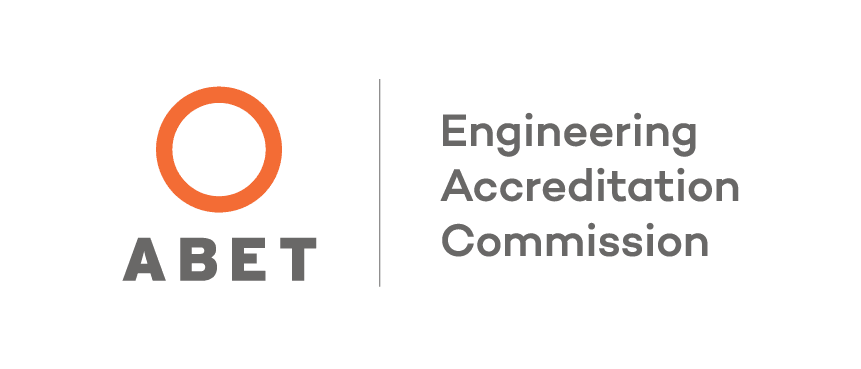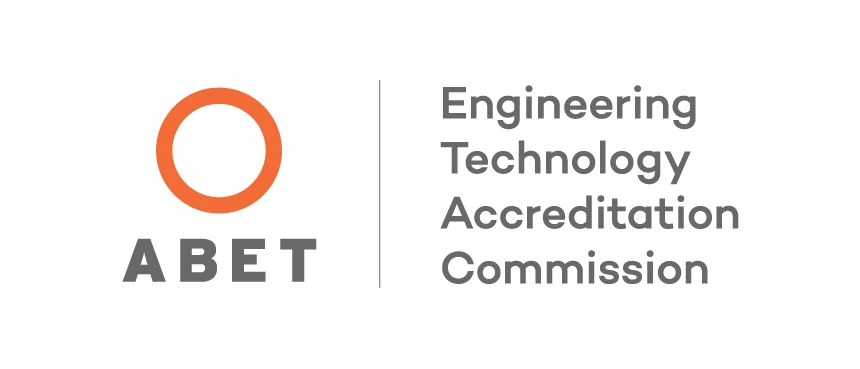View our accreditation information, program educational objectives, student outcomes, and enrollment information below.
- Engineering
- Engineering Technology
ABET Accreditation
ABET is a national accrediting agency that sets standards for and evaluates the quality of educational programs in the fields of engineering and technology. Find out why accreditation is important.
The following programs at LeTourneau University are currently accredited by the Engineering Accreditation Commission of ABET, https://www.abet.org:
 |
• B.S. in Civil EngineeringIncludes Environmental Concentration• B.S. in Electrical and Computer EngineeringIncludes Electrical, Computer, Mechatronics, and Biomedical Concentrations• B.S. in Mechanical Engineering• B.S. in EngineeringIncludes Welding and Materials Joining Concentration |
Degrees through the School of Engineering and Engineering Technology, like all LETU degrees, are also regionally accredited.
PROGRAM EDUCATIONAL OBJECTIVES
These program educational objectives are based upon input from our constituents.
Within a few years of graduation, graduates will:
- advance in the engineering profession or be pursuing graduate education in engineering or related fields;
- continue professional development throughout their career; and
- demonstrate competence, ingenuity, integrity, and integration of faith and work.
Student Outcomes
The intended student outcomes for the engineering, mechanical engineering, civil engineering, and electrical and computer engineering programs are that graduates will have:
- SO1. an ability to identify, formulate, and solve complex engineering problems by applying principles of engineering, science, and mathematics
- SO2. an ability to apply engineering design to produce solutions that meet specified needs with consideration of public health, safety, and welfare, as well as global, cultural, social, environmental, and economic factors
- SO3. an ability to communicate effectively with a range of audiences
- SO4. an ability to recognize ethical and professional responsibilities in engineering situations and make informed judgments, which must consider the impact of engineering solutions in global, economic, environmental, and societal contexts
- SO5. an ability to function effectively on a team whose members together provide leadership, create a collaborative and inclusive environment, establish goals, plan tasks, and meet objectives
- SO6. an ability to develop and conduct appropriate experimentation, analyze and interpret data, and use engineering judgment to draw conclusions
- SO7. an ability to acquire and apply new knowledge as needed, using appropriate learning strategies.
Student Enrollment and Graduation Data
| Mechanical Engineering B.S. | 2019-20 | 2020-21 | 2021-22 | 2022-23 | 2023-24 |
|---|---|---|---|---|---|
| Total Enrollment | 207 | 200 | 204 | 203 | 216 |
| Graduates | 51 | 39 | 39 | 42 | 50 |
| Civil Engineering B.S. | 2019-20 | 2020-21 | 2021-22 | 2022-23 | 2023-24 |
|---|---|---|---|---|---|
| General Concentration | 19 | 39 | 57 | 58 | 49 |
| Environmental Concentration | 2 | 4 | 5 | 7 | 10 |
| Total Enrollment | 21 | 43 | 62 | 65 | 59 |
| Graduates | N/A | 9 | 7 | 15 | 11 |
| Electrical and Computer Engineering B.S. | 2019-20 | 2020-21 | 2021-22 | 2022-23 | 2023-24 |
|---|---|---|---|---|---|
| Electrical Concentration | N/A | 12 | 27 | 33 | 33 |
| Computer Concentration | N/A | 14 | 24 | 21 | 15 |
| Mechatronics Concentration | N/A | 4 | 14 | 27 | 33 |
| Biomedical Concentration | N/A | N/A | N/A | N/A | 17 |
| Total Enrollment | N/A | 30 | 65 | 81 | 98 |
| Graduates | N/A | 9 | 13 | 14 | 22 |
| Engineering B.S. | 2019-20 | 2020-21 | 2021-22 | 2022-23 | 2023-24 |
|---|---|---|---|---|---|
| Biomedical Concentration | 44 | 36 | 35 | 27 | 11 |
| Civil Concentration | 26 | 6 | 3 | 1 | N/A |
| Computer Concentration | 26 | 14 | 2 | 1 | N/A |
| Electrical Concentration | 35 | 20 | 7 | 2 | N/A |
| Materials Joining Concentration | 34 | 28 | 23 | 20 | 21 |
| Total Enrollment | 165 | 104 | 70 | 51 | 32 |
| Graduates | 34 | 19 | 16 | 17 | 12 |
ABET Accreditation
ABET is a national accrediting agency that sets standards for and evaluates the quality of educational programs in the fields of engineering and technology. Find out why accreditation is important.
The following program at LeTourneau University is currently accredited by the Engineering Technology Accreditation Commission of ABET, https://www.abet.org:
 |
• B.S. in Engineering TechnologyIncludes Concentrations in: Electrical, Automation, and Robotics; Welding and Materials Joining; Mechanical; Aeronautical-Electrical; and Aeronautical-Mechanical |
Degrees through the School of Engineering and Engineering Technology, like all LETU degrees, are also regionally accredited.
Program Educational Objectives
These program educational objectives are based upon input from our constituents.
Within a few years of graduation, LeTourneau Engineering Technology graduates will:
- demonstrate technical competence, hands-on skills, and solve problems with ingenuity;
- communicate effectively, encourage and respect others, and grow towards becoming a valuable team member and mentor;
- demonstrate persistence, provide leadership, advance in responsibility and expertise, and keep current in their field;
- display integrity and care consistent with the example of Christ.
Student Outcomes
The intended student outcomes for the engineering technology program are that graduates will have:
- SO1. an ability to apply knowledge, techniques, skills and modern tools of mathematics, science, engineering, and technology to solve broadly-defined engineering problems appropriate to the discipline
- SO2. an ability to design systems, components, or processes meeting specified needs for broadly-defined engineering problems appropriate to the discipline
- SO3. an ability to apply written, oral, and graphical communication in broadly-defined technical and non-technical environments; and an ability to identify and use appropriate technical literature
- SO4. an ability to conduct standard tests, measurements, and experiments and to analyze and interpret the results to improve processes
- SO5. an ability to function effectively as a member as well as a leader on technical teams
Student Enrollment and Graduation Data
| Engineering Technology B.S. Concentrations: |
2019-20 | 2020-21 | 2021-22 | 2022-23 | 2023-24 |
|---|---|---|---|---|---|
| Aero-Electrical | 3 | 4 | 3 | 4 | 2 |
| Aero-Mechanical | 6 | 4 | 9 | 10 | 11 |
| Electrical, Automation, and Robotics | 5 | 5 | 6 | 6 | 3 |
| Mechanical | 38 | 29 | 28 | 30 | 33 |
| Materials Joining | 15 | 14 | 12 | 19 | 20 |
| Total Enrollment | 67 | 56 | 58 | 69 | 69 |
| Graduates | 12 | 11 | 7 | 11 | 13 |